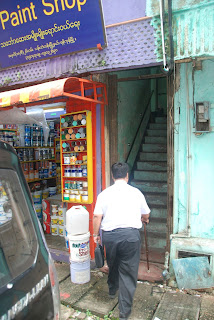Yesterday completed my two weeks of teaching in Yangon. We
ended our time by singing Amazing Grace together and in prayer. It has been a
privilege to get to know my students, and hopefully, in some small way, to be
of service to them for their ministry. Indeed, they can do what I could never
do, and so I have had the honor of prayerfully helping them do it better.
The final activity of the class was for my students each to
teach a part of the class. I am very thankful for what they were able to do.
So now I return to a different world. And how have I
changed? I’m not certain. But I can see that I have gained from having studied
this material alongside my students. My conviction for the significance of the
educational ministry of the church is stronger than ever, and I am thankful for
how this time has enabled me to develop my own approach to teaching and
learning in a local church. I have gained by praying together with them through
the various struggles and challenges of life. I have gained by my interactions
with my roommate as together we thought through challenging issues related to
life and ministry, and as he offered a listening ear and plenty of excellent
counsel related to the vision of a “multi-national church plant” we are
pursuing. I have learned from God’s Word as He continues to teach me, and from
prayer, as I learn to listen more clearly to Him. I have learned from being
distant from my family, when I was powerless to take care of things from afar.
I am so thankful for how others have served, how God has provided, and how each
one in my family has grown, in my absence. (And now I’m ready to be with them
again!)
So thank you to all of you who prayed for this time. I asked
for prayer for health and safety, and so far, I have had both. I asked for
prayer that I could serve these people well. I think, in some small way, God
has worked that through me by His Spirit. And I asked for prayer for my family,
and God has been with each one.
One of my main challenges to my students was that they be
involved in shaping the whole of people, and not just their minds as we so
often do when we think about teaching. We are to love God with our thinking,
with our emotions and wills and relationships, and with our strength. And so I
endeavor to do the same, loving God with more and more of who I am even as I
endeavor to help others do the same.
God is faithful, and He is good. So we walk in confidence
into an unknown future … unknown only in the details. For the big picture is
clear for all who have entrusted their souls to their faithful creator.









